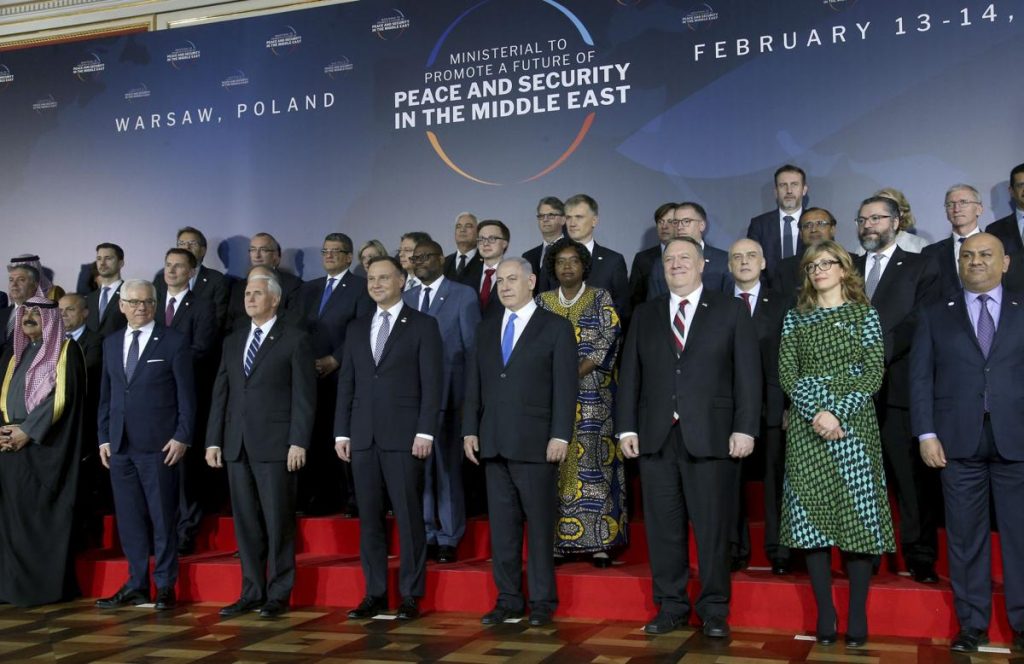Australia/Israel Review
Iran and Palestinians the losers in Warsaw
Feb 28, 2019 | Eyal Zisser

The Warsaw conference for peace and security in the Middle East in Poland on Feb. 13 and 14 did not yet signal peaceful tidings for the region. The summit, which was sponsored by the United States and encouraged by Israel with the goal of establishing a regional and international coalition against Iran, was an important step toward curbing Teheran’s expansionist aspirations and terrorist subversion. Still, it was just one step on a long path ahead.
From this perspective, US Secretary of State Mike Pompeo was right to say during the summit that Iran can only be stopped by force, in other words with collective determination and a proactive approach – for example through painful economic sanctions or Israel’s military campaign against the Iranians and their proxies in Syria.
For this reason, the spotlight during the summit focused primarily on Israel, not necessarily Iran. The Arab and international media rightly described Israel as the summit’s big winner but also as a main player behind the scenes and in the regional developments likely to ensue.
These reports have far-reaching implications for Israel’s relations with the Arab world. Arab countries, mainly Gulf states, didn’t hesitate to partake in the summit alongside Israel, were willing to accept it as a full partner and even as a leader in the regional fight against Iran.
This is the notable distinction between the Warsaw conference and previous summits with Israeli and Arab representatives. This is also the difference between the emerging regional coalition and coalitions of the past, such as the “alliance of the periphery” against Egyptian President Gamal Abdel Nasser in the 1950s – which included Israel, Ethiopia, Turkey and Iran. These alliances were secret and limited, and Israel wasn’t viewed as a leading player.
Today, however, Israel is perceived in the Arab world as a military and economic power with clout on the international stage, specifically in Washington. It is also perceived as unafraid of direct conflict with Iran, and therefore as a desirable partner. It seems the Arabs need Israel to help stabilise the region more than it needs them.
The Arab willingness to stand beside, and essentially behind, Israel at the conference, further evidences the fact that the Palestinian question has lost its prominence in the Arab world and regardless no longer prevents the advancement of relations between Israel and the Arabs. This is nothing new: In 1977, then-Egyptian President Anwar Sadat decided to pursue peace with Israel and prioritise his country’s own interests over those of the Arabs and Palestinians. In 1994, King Hussein of Jordan followed in Sadat’s footsteps and surprised the sceptics who said the Hashemite kingdom would never make peace with Israel before the Palestinian problem was resolved.
There’s no question that the Arab world’s journey to peace with Israel is a long and arduous one. And yet, the general direction is forward. Case in point, Egyptian President Abdel-Fattah el-Sissi unreservedly confirmed reports that his army and the IDF were working closely together to eradicate Islamist terrorists from the Sinai Peninsula; while Jordan is almost completely reliant on Israel for water and natural gas.
Yes, the Arab street is still averse and even hostile toward Israel, but it is willing to accept relations with it. The fact is that even at the height of the Arab Spring in Egypt, no one demanded that relations with Israel be severed. And in Jordan – which is more sensitive to the Palestinian issue due to its own demographic situation – no one suggests tearing up the peace treaty with Israel.
Similar to Turkey and Iran as well, Israel is viewed in the Arab world as a non-Arab entity and therefore as a competitor deserving of scepticism and suspicion. This won’t change even if Israel and the Palestinian Authority come to an arrangement. And yet, it is instructive and fascinating to discover that so many countries in the Arab world feel safe in their pursuit of relations with Israel and prefer it over relations with Ankara and Teheran.
Eyal Zisser is a lecturer in the Middle East History Department at Tel Aviv University. © Israel Hayom (www.israelhayom.com), reprinted by permission, all rights reserved.
Tags: Europe, Iran, Israel, Middle East, Palestinians






